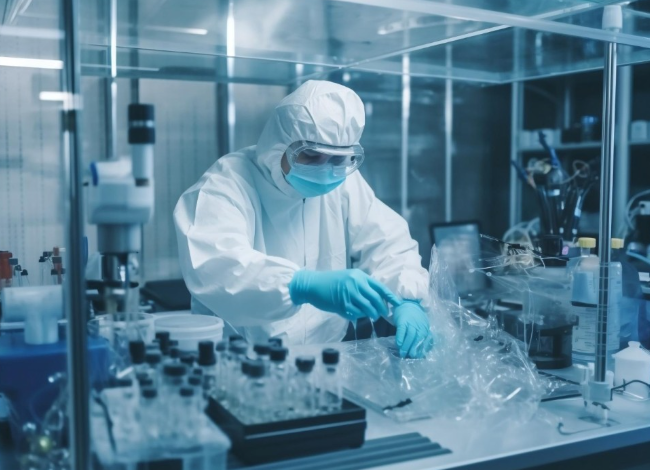Exploring AI’s Impact on the Pharmaceutical Industry

In recent years, artificial intelligence (AI) has revolutionized various sectors, and the pharmaceutical industry is no exception. The integration of AI in pharmaceutical research, drug development, and healthcare has led to significant advancements that have the potential to improve patient outcomes, reduce costs, and enhance efficiency. This article will delve into the various ways AI is impacting the pharmaceutical industry and shaping the future of healthcare.
The utilization of AI in pharmaceutical research has accelerated the process of drug discovery by analyzing massive amounts of data to identify potential drug candidates in a fraction of the time it would take using traditional methods. AI algorithms can sift through genetic, chemical, and clinical data to predict drug responses, identify biomarkers, and personalize treatment plans for patients.
In drug development, AI algorithms are being used to design molecules with specific properties, optimize clinical trial design, and predict potential side effects more accurately. This has the potential to reduce the time and cost associated with bringing a new drug to market, ultimately benefiting patients by providing them with innovative and effective treatments in a timelier manner.
Moreover, AI is transforming healthcare delivery by improving diagnostic accuracy, predicting disease outbreaks, and personalizing patient care. AI-powered tools, such as those for AI medical diagnosis, can analyze medical images, genetic data, and clinical notes to assist healthcare providers in making more informed decisions, leading to better outcomes for patients. Additionally, AI can help in managing healthcare resources more efficiently, streamlining administrative tasks, and reducing medical errors.
Overall, the integration of AI in the pharmaceutical industry is revolutionizing the way drugs are discovered, developed, and delivered to patients. By harnessing the power of AI technologies, the industry is poised to make significant strides in improving patient care, reducing healthcare costs, and advancing medical research. The future of healthcare looks promising with AI paving the way for innovative solutions that have the potential to transform the landscape of medicine as we know it.
AI in Drug Discovery and Development
One of the most prominent areas where AI is making a significant impact in the pharmaceutical industry is drug discovery and development. Traditional drug discovery methods are time-consuming, expensive, and often result in high failure rates. AI-powered algorithms have the ability to analyze vast amounts of data quickly and efficiently, leading to the identification of potential drug candidates in a fraction of the time it would take using conventional methods.
AI is revolutionizing the drug discovery process by accelerating the identification of new drug candidates, predicting their efficacy, and even designing new molecules with specific properties. This has the potential to significantly reduce the time and cost involved in bringing a new drug to market, as well as improving the success rate of clinical trials.
Additionally, AI can help researchers better understand diseases, identify new drug targets, and personalize treatments for patients based on their unique genetic makeup. Overall, the integration of AI in drug discovery and development is transforming the pharmaceutical industry and has the potential to bring about groundbreaking advancements in healthcare.
Read also: Polystyrene for Packaging: An Essential Guide
Personalized Medicine and Precision Healthcare
Another area where AI is revolutionizing the pharmaceutical industry is in the realm of personalized medicine and precision healthcare. Traditional one-size-fits-all treatment approaches are being replaced by personalized therapies that take into account an individual’s unique genetic makeup, lifestyle factors, and environmental influences.
This shift towards personalized medicine is made possible by AI algorithms that analyze vast amounts of data to identify patterns and trends that can help tailor treatments to each patient’s specific needs. By taking a more targeted approach, healthcare providers can improve patient outcomes, reduce the risk of adverse reactions, and ultimately lower healthcare costs. AI is enabling a new era of precision healthcare where treatments are not only more effective but also more personalized and tailored to each individual’s unique biology and circumstances.
Enhancing Clinical Decision-Making
AI is also reshaping clinical decision-making processes in the pharmaceutical industry by providing healthcare professionals with valuable insights and recommendations based on real-time data analysis. For example, AI-powered tools can help physicians diagnose diseases more accurately, predict patient outcomes, and suggest optimal treatment regimens.
Challenges and Opportunities
While the integration of AI in the pharmaceutical industry holds great promise, it also presents several challenges that need to be addressed. Data privacy and security concerns, regulatory hurdles, and ethical considerations are some of the key issues that must be carefully navigated to ensure the responsible use of AI technologies in healthcare.
AI technologies have the potential to revolutionize drug discovery, improve patient care, enhance clinical trials, and optimize supply chain management in the pharmaceutical industry. However, the industry must be vigilant in addressing the challenges that come with the integration of AI.
Data privacy and security concerns are paramount, as AI systems rely on vast amounts of patient data to operate effectively. Pharmaceutical companies must ensure that sensitive patient information is protected and that data sharing is done in compliance with regulations such as GDPR and HIPAA.
Regulatory hurdles also pose a significant challenge, as the fast-paced nature of AI innovation can outpace regulatory frameworks. Pharmaceutical companies must work closely with regulators to ensure that AI technologies meet safety and efficacy standards before being deployed in real-world settings.
Ethical considerations are another critical factor to consider when integrating AI in the pharmaceutical industry. Issues such as bias in algorithms, transparency in decision-making processes, and the impact on healthcare professionals and patients must be carefully addressed to build trust in AI technologies.
By proactively tackling these challenges, the pharmaceutical industry can harness the potential of AI to drive innovation, improve patient outcomes, and ultimately transform healthcare delivery on a global scale.
The Future of AI in Pharmaceuticals
As AI continues to evolve and become more sophisticated, its impact on the pharmaceutical industry is expected to grow exponentially. From accelerating drug discovery and development to enabling personalized medicine and transforming clinical decision-making, AI has the potential to revolutionize healthcare in ways we have never imagined.




